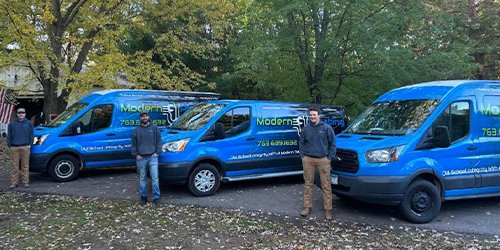Boost Your Homes Water Pressure With These Expert Tips

Few things are more frustrating than turning on the shower or faucet only to be greeted by a weak stream of water. Low water pressure can affect various household chores, from washing dishes to taking a comforting, soaking bath.
But you don’t have to deal with this annoyance for long! In this blog post, the plumbing experts at Modern Plumbing & Heating explain how to fix low water pressure in your home, making your daily routine more efficient and enjoyable.
What Causes Low Water Pressure?
Low water pressure can result from various factors requiring a different approach to fix each one. Understanding the root cause is the first step toward a solution.
Several common issues include clogged pipes, leaks, and problems with the municipal water supply. Mineral deposits and sediment buildup in pipes can also be significant culprits.
Issues With Municipal Water Supply
Sometimes, the problem isn't within your home but with the city water supply. Scheduled maintenance or an unexpected break in the main water line can cause temporary low water pressure. If this is the case, contacting your local water department can help clarify the situation.
Home-Based Problems
Other times, the issue lies within your household plumbing. Faulty fixtures or an incorrectly set pressure regulator can be the cause. For example, outdated or worn-out fixtures may not function as efficiently as newer models.
Diagnosing Water Pressure Problems
Before pursuing solutions, you need to diagnose the issue correctly. Proper diagnosis involves checking various points in your plumbing system and may require a little help from our pros.
Here’s what to check:
- Check Individual Fixtures: Identify whether the problem is isolated to specific fixtures or affects the entire house. Test different taps and showers to see if the issue is localized. If only one fixture has low pressure, the problem might be a simple fix like cleaning or replacing that fixture.
- Inspect Pressure Regulators: Pressure regulators, also known as pressure-reducing valves, control the water pressure entering your home. If this device malfunctions, it can significantly impact your water flow. Checking and adjusting your pressure regulator can often resolve low-pressure issues.
- Examine Pipes for Leaks: Leaks can be a major contributor to low water pressure. Inspect your plumbing system for visible leaks and listen for any unusual sounds that might indicate a hidden leak. Our professional plumbers can help with more thorough leak detection using specialized cameras and equipment.
How Often Should You Check Your Home’s Water Pressure?
Regular maintenance is key to avoiding persistent water pressure issues. But how often should you check?
Regularly checking your water pressure can help identify problems before they become severe. A simple pressure gauge can measure the pressure at various points in your plumbing system. We recommend performing this check every month or so.
Certain times of the year may be more prone to water pressure issues. For example, winter can cause freezing pipes, which may lead to leaks and reduced pressure. Conducting seasonal checks or checking more frequently in winter can help you address these issues proactively.
While DIY checks are useful, periodic professional inspections can provide more comprehensive insights. Our plumbers use advanced tools and techniques to detect hidden issues, ensuring your home's plumbing system is in top shape, from drains to sewer pipes.
Can Low Water Pressure Indicate a Larger Plumbing Issue?
Low water pressure is often a symptom of a more significant issue. Identifying the underlying cause is crucial for a long-term solution. Persistent low water pressure can indicate larger problems like failing pipes or a compromised water main. Ignoring these signs can lead to more severe issues and costly repairs down the line.
In some cases, low water pressure can lead to stagnant water in pipes, which can become a breeding ground for bacteria. Ensuring adequate water flow is essential for maintaining a healthy home environment.
Implementing preventive measures can help you avoid long-term problems. Regular maintenance, timely repairs, and using high-quality plumbing materials can extend the lifespan of your plumbing system.
Improve Your Home’s Water Pressure Quickly With Our Experts
Fixing low water pressure in your home doesn't have to be daunting. Understanding the causes, diagnosing the issues, and implementing the right solutions can ensure a steady and robust water flow throughout your home. Regular maintenance and timely interventions are key to avoiding persistent problems.
If you're unsure where to start or need professional assistance, don't hesitate to contact our plumbing experts. Our team offers valuable insights and solutions tailored to your specific needs. With over 35 years of combined experience, our experts bring integrity with a modern touch to every plumbing repair or emergency plumbing project!
Request a free estimate on any plumbing project, or schedule a water pressure inspection with us today!